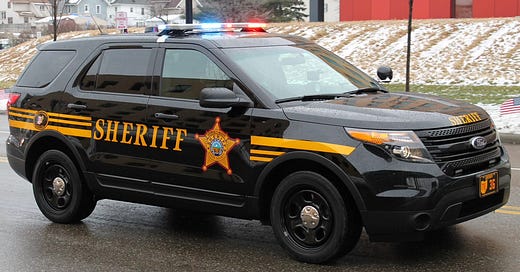
America's Local Authoritarians
Trump may be bringing patrimonialism to D.C., but across America’s heartlands, a thousand little chieftains reign
In a recent New York Times essay, Stephen E. Hanson and Jeffrey S. Kopstein warn that Trump’s return will bring a renewed assault on the institutions of the modern government. It’s a concise distillation of their book, The Assault on the State: How the Global Attack on Modern Government Endangers Our Future, which argues that authoritarian-style leaders are bringing pre-modern modes of politics like patrimonialism back into vogue.
Moscow, Budapest, and Ankara provide examples of the sort of patronage-based, insider-dealing governance Trump II will pursue. But we can also look more locally, at the county sheriffs who dominate the practice of politics and application of justice in America’s heartlands.
In many of these areas, sheriffs wield a near-exclusive kind of power and take advantage of minimal oversight to operate however they please. As Jessica Pishko—a fellow for my organization, the Pulaski Institution—notes in her book The Highest Law in the Land: How the Unchecked Power of Sheriffs Threatens Democracy, “The office of sheriff is uniquely able to morph as the sheriff himself requires. It is this versatility, alongside the freedom to express highly partisan views, that makes the sheriff (and his employees) prone to abuse of office, corruption, and misbehavior.”
The American sheriff’s power is a pre-modern holdover. Writing at Process, the blog for the Organization of American Historians, Cindy Hammovitch observes “The first thing that struck me is how similar American sheriffs were to their medieval counterparts. Medieval sheriffs’ job was to keep order in a way that secured the crown’s power, which allowed them to secure their own power through force and profit from their positions. They had extensive job descriptions, which were almost identical to those of modern American sheriffs”
So it’s not any surprise that the abuses also conform to the sort of patrimonial and archaic problems that Hanson and Kopstein warn about. “Sheriffs can and do run their office as an extension of themselves, which means they hire relatives and give favors to donors,” Pishko told me.
Stories abound of sheriffs hiring famikly members and friends. This year, in Spartanburg, South Carolina, Sheriff Chuck Wright hired his own son as a deputy. The move triggered an ethics investigation–the kind of oversight not always applied to sheriffs offices–but also speaks to a more pervasive mindset within America’s county sheriffs.”
Benefits also accrue to donors and political backers. In Culpeper County, Virginia, Sheriff Scott Jenkins was convicted on federal charges for taking bribes and distributing favors, including appointing deputies.
This is an especially alarming dynamic when coupled with the investigating and jailing powers of the office. Sheriffs’ role in maintaining jails is one of their better known responsibilities. They also exercise the right to civil asset forfeiture and to act as coroners. As Pishko notes, 41 counties in California give sheriffs this medical authority, handing them the power of “officially determining a cause of death—for example, whether a death is a homicide or accident.”
Beyond Normal Constraints
The electoral oversight that should act as one of the few checks on local sheriffs rarely does. Sheriffs frequently avoid competitive elections, acting as patrons to the very people who might one day succeed them. In many small-population rural communities, sheriffs control who gets police jobs and therefore who gains law enforcement experience. As Emily Farris and Mirya Holman write at Governing, sheriffs “control the pool of political competition by directly managing those individuals who might one day challenge them for the job.”
Some skirt ethics rules to give badges to relatives, personal friends, and friends of donors. They build out patronage networks, and effectively set up lines of succession.
For both sheriffs and deputies, the actual job requirements are often scant. Most places in America, there isn’t a lot of crime.
This means that, other than in cases of naked abuse, there isn’t much to differentiate a bad hire from a corrupt one.
Things become alarming when we consider the rise of extremism among American sheriffs, particularly the constitutional sheriff movement. These sheriffs, who see themselves as exercising a specially ordained place in the American political order outside of normal controls, are gaining traction. All of this is compounded by an environment where sheriff misconduct is regularly overlooked and ignored, as Pishko reports in her book.
Another Trump administration presents serious challenges for American democracy. The potential for corruption, patronage, and a general politics of pillage and plunder at the highest level is disastrous. But American democracy is also its democracies. Federalism is a blessing and curse.
Many Americans live with a deteriorating democratic life just outside their front door, from state legislatures and courts engaging in serious overreach to state AGs pursuing aggressive culture war policies.
But in many communities, the sheriff is a one-stop shop of political power. And the abuses mean that local communities experience a breakdown in what should be the kind of accountable, transparent, and public-serving local politics we expect in any liberal democratic society.
It’s untrue that every sheriff’s office in the United States is operated by a wannabe feudal lord. And it’s unfair to mischaracterize the hard work of officers attempting to protect and serve the public to the best of their abilities. But the American landscape is already dotted by fiefdoms run on patrimonialism and an older, rusted sort of power unfit for one of the world’s great liberal democracies.
With the return of President Trump—a convicted felon with no regard for constitutional restraints and a love for brute force—the nation’s most power-hungry sheriffs will feel empowered to rule their counties as they see fit.





